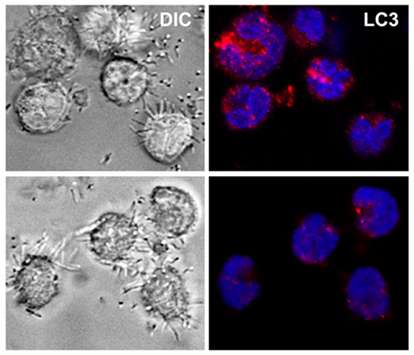How 'trained immunity' mediates BCG therapy of bladder cancer

Bacillus Calmette-Guerin (BCG) is a vaccine widely used in low and middle-income countries to protect against childhood tuberculosis. Besides its specific anti-tuberculosis effects, BCG can also function as a general immune-booster, and in this capacity is used in the treatment of certain bladder cancers. A study published on October 30th in PLOS Pathogens now reports that autophagy (the removal and degradation of unnecessary or dysfunctional components within cells) plays a central role in mediating the non-specific immune effects of BCG.
Leo Joosten, from the Radboud University Medical Center in Nijmegen, The Netherlands, and colleagues had previously coined the term "trained immunity" to describe the state of heightened immune response to subsequent infection by a range of pathogens that is induced by BCG. Trained immunity is known to involve reprogramming of immune cells called monocytes, resulting in production of higher levels of non-specific immune-stimulators. Together with researchers from the Broad Institute and the University of Groningen they now further examine the mechanisms underlying trained immunity.
A comparison between trained and untrained monocytes from healthy volunteers suggested the possibility that autophagy played a role. When the researchers then tried to train monocytes in the presence of drugs that inhibit autophagy, they were unable to do so, suggesting that autophagy is indeed necessary for training. Consistent with this, the researchers found that such drugs could block the specific molecular reprogramming of immune-related genes usually seen in monocytes in response to BCG.
The researchers also asked whether variants in genes involved in autophagy can affect trained immunity and found that a particular variation in an autophagy gene called ATG2B can indeed influence the ability of BCG to induce trained immunity. A particular variation in ATG2B results in two versions of the gene—one with a "G" residue at position 1383 and one with a "C" residue—and each person has two copies of the gene. When the researchers exposed a mix of individuals to BCG, they found that those with two "G" versions and those with one "G" and one "C" version respond with trained immunity, whereas those with two "C" versions do not. Moreover, monocytes from GG and GC individuals (but not from CC individuals) still showed hallmarks of trained immunity 3 months after BCG vaccination.
Because BCG is used as an immune-booster in the treatment of certain bladder cancers, the researchers also tested whether the different versions of the ATG2B gene were associated with different outcome in BCG-treated bladder cancer patients. They found that CC individuals had an increased risk of cancer progression and recurrence compared with GG individuals, supporting the hypothesis that the role of autophagy in the response to BCG is clinically relevant.
While the specific ways by which autophagy mediates the reprogramming of immune cells remain to be determined, and the results in bladder cancer treatment need to be confirmed in additional patients, the researchers conclude that "identification of autophagy as a driver of trained immunity opens new possibilities for improvement of future BCG vaccines to be used against infections and malignancies".
More information: Buffen K, Oosting M, Quintin J, Ng A, Kleinnijenhuis J, et al. (2014) Autophagy Controls BCG-Induced Trained Immunity and the Response to Intravesical BCG Therapy for Bladder Cancer. PLoS Pathog 10(10): e1004485. DOI: 10.1371/journal.ppat.1004485















